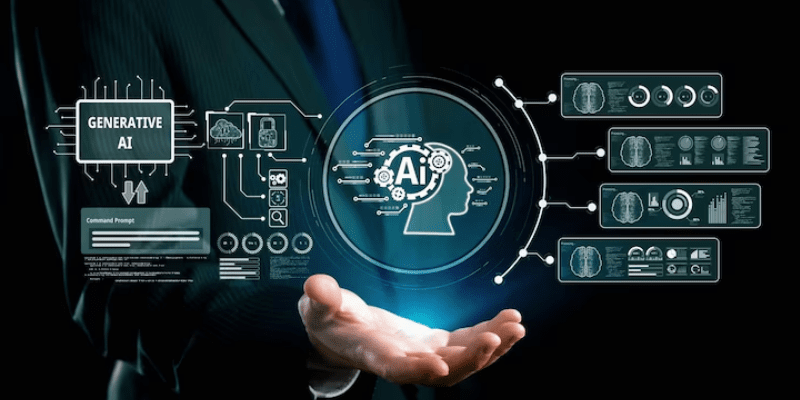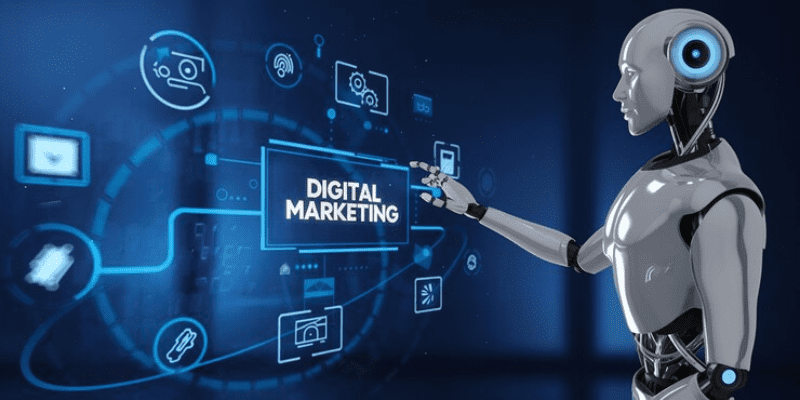The Role of Artificial Intelligence in Digital Marketing | Must Read
Published: 22/Jun/2025
In today’s world, almost everything is connected to the internet. We shop online, chat online, watch videos online, and also learn online. Every day, with so many people using phones and computers, companies want to reach them smartly. But doing so can be very difficult if you don’t know what people want or like. This is where artificial intelligence (AI) comes in as a super-smart robot that helps companies talk to the right people at the right time with the right message.

AI is short for artificial intelligence. This means smart machines that can think, learn, and decide, as humans do, but quickly and without getting tired. When AI is used in digital marketing, it helps companies to find and understand, send support messages, create materials, and even talk to customers through chatbots.
The Role of AI in Digital Marketing?
Let’s begin with the fundamentals. AI encompasses systems and machines capable of processing information, reasoning, learning from data, and making decisions. These processes can be executed with greater efficiency than humans.
AI in digital marketing is the practice of promoting products or services online. Thus, we get AI in digital marketing, artificial intelligence assisting firms in promoting their services and products over the internet.
This covers:
- Algorithmic ad targeting
- Content generation
- Conversations with customers using automated chat systems
- Customer sentiment analysis
What Are the Roles of AI for You in the Field of Marketing?
For example, you used to have a social media person whose job was to create posts on the various platforms. They would write all the copies for every email, guess what people want to read about, and at times, just post content without any clear plan.
Now, those tasks can be performed by tools that are specifically designed for these purposes that support artificial intelligence with adequate programming infrastructure, associated algorithms, and ushering proper prominence.
Here is a list elaborating as to why such things as the position we were discussing previously are required nowadays:
- Agility—every single action and mission is not processed; don’t forget you are super slow.
- Infallibility—no matter how advanced an intelligent system claims itself to be, no single person will ever match machine-powered automations when it comes to reasoning, deriving conclusions, and scanning too many variables exceptionally fast.
Types of AI in digital marketing
Now let’s explore how marketers have integrated artificial intelligence into their day-to-day operations.

- Machine Learning in Marketing
Machine learning refers to a field of computer science where computers can learn on their own from previously acquired knowledge. For instance, consider the case where an individual purchases shoes via an e-commerce platform; the system logging the transaction acquires knowledge on the different products being sold in their shop.
This is an example of machine learning taking place in marketing, employing data for smarter business decisions.
- Marking Automation Systems Powered by AIs
Many technologies made possible with AI offer automation for various business functions, like
Determining and predicting market trends and interests. Generating various forms of content, such as emails and blog posts. Flagging the most optimal time to send messages, monitoring & analyzing user engagement
Among some of these tools, we can find
Chatbots—automated systems that engage users through text, communicating seamlessly. Email Automation: AI-marked emails allow swift exchanges filled with relevant information directed at particular individuals. Tools aimed at content generation: Captions and even entire advertising pieces, including IV-initiated dialogues!
- The Use of AIs to Help People Generate Content
Gaining high-quality content requires a lot of time, but it can be easily accessed with a few clicks with assisted creation.
- Writing blogs, Issuing descriptions for products already available online, Issuing or preparing articles/articles in other aspects for various social networks, minus, say, emails
- The good news: AI adapts, thus mimicking your writing style!
4. Future analysis in marketing
Have you ever guessed what gift your friend might like? This is called prediction. AI does the same using data. This is called predictive analysis in marketing.

AI noticed what people did earlier to guess what they can do next. For example:
- Will they buy again?
- What product do they like?
- When are they shopping?
This helps companies send better offers and messages.
Benefits of Using AI in Digital Marketing
Let’s break down all the good things AI brings:
| Benefit | What it Means |
| Faster Work | AI saves time via doing jobs fast |
| Better Content | AI writes catchy and clever posts |
| More Sales | Targeted commercials and gives carry more customers |
| Smart Decisions | AI uses facts to make higher plans |
Example of real life: In AI action
Imagine Sara is the owner of a small online clothing store. She wants to sell more clothes, but doesn’t know what her customers like. Using AI in digital marketing, her site begins to learn what visitors are looking at, such as colors, shapes, or styles that are popular. The system also learns when people usually act and what kind of messages they respond to. Based on this, the store displays products that each visitor is most likely to love.
AI also helps write product details and messages that people like to read. When people ask questions, smart features answer immediately, even late at night. As a result, Sara’s business gets more sales, customers feel happy, and everything goes smoother—thanks to the smart use of artificial intelligence in all marketing.
AI’s challenges in digital marketing
AI is a super assistant, but that’s not right. Some challenges include:
- Learn condition – not everyone knows how to use the AI tool
- Cost – any equipment can be expensive
- Problems with Privacy – AI uses data, and companies should protect it
- Over, if we are addicted to AI, we can forget about the human touch
AI’s future in digital marketing
AI grows every day. In the future, we will see even more smart equipment:
- AI video producing
- AI calls as a human in a conversation
- AI designs sites
- Personal Marketing Message AI is only written for you
- The future of artificial intelligence in marketing is super exciting!
Conclusion
AI in digital marketing. AI is not just a trend in digital marketing—this is the future. This helps companies understand their customers, create better material, send smart messages, and make quick decisions. With the help of artificial intelligence in marketing, even small businesses can grow rapidly and contact people more individually.
Whether it is machine learning, predictive analysis, or AI-driven content creation, AI marketing makes it easy, faster, and more successful. And the best part? You do not need to be a computer specialist to use it. AI is here to help everyone, from large companies to small shops.
FAQs
Q: What is the future of analysis in marketing?
A: The future analysis uses previous customer functions to estimate what they can do in the future. This helps companies offer better products or messages at the right time.
Q: Is AI marketing expensive?
A: Some equipment is free or low-cost. Others may be more expensive. But many companies save money and time by investing in AI.
Q: Will AI handle all marketing jobs?
A: No. AI helps with tasks, but human creativity, emotions, and conditions are still very important in marketing.
Q: What is machine learning in digital marketing?
A: Machine learning means that AI learns from previous data and becomes smarter over time. It helps to guess what customers want next.
Q: How does artificial intelligence help?
A: AI helps understand what people like, send the right message at the right time, make material, and talk to customers through a chatbot.
Read More:
- Best Ways to Convert Website Visitors into Paying Clients
- Instagram vs TikTok: Where Should You Market in 2025?
- Affiliate Marketing vs Dropshipping: Which Makes More Money?





